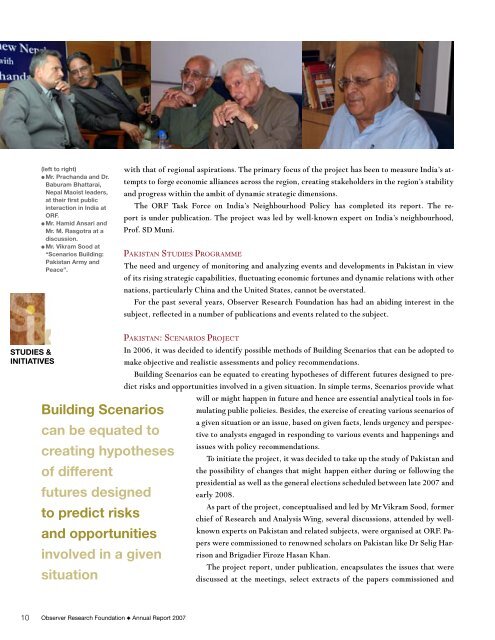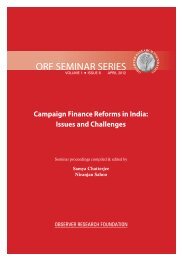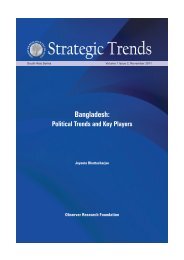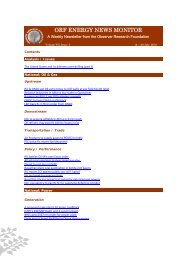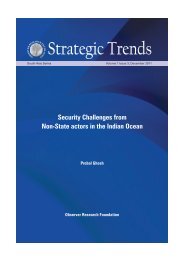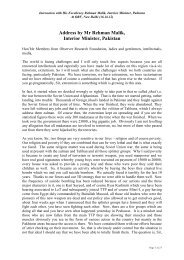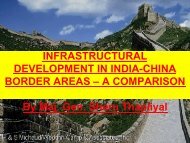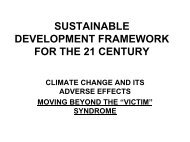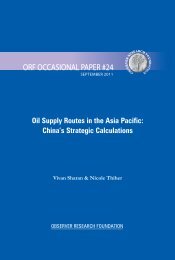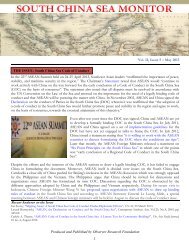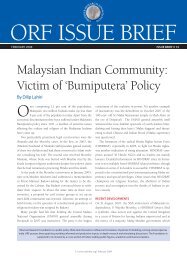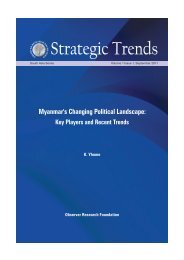Annual Report 2007 - Observer Research Foundation
Annual Report 2007 - Observer Research Foundation
Annual Report 2007 - Observer Research Foundation
You also want an ePaper? Increase the reach of your titles
YUMPU automatically turns print PDFs into web optimized ePapers that Google loves.
(left to right)<br />
● Mr. Prachanda and Dr.<br />
Baburam Bhattarai,<br />
Nepal Maoist leaders,<br />
at their first public<br />
interaction in India at<br />
ORF.<br />
● Mr. Hamid Ansari and<br />
Mr. M. Rasgotra at a<br />
discussion.<br />
● Mr. Vikram Sood at<br />
“Scenarios Building:<br />
Pakistan Army and<br />
Peace”.<br />
with that of regional aspirations. The primary focus of the project has been to measure India’s attempts<br />
to forge economic alliances across the region, creating stakeholders in the region’s stability<br />
and progress within the ambit of dynamic strategic dimensions.<br />
The ORF Task Force on India’s Neighbourhood Policy has completed its report. The report<br />
is under publication. The project was led by well-known expert on India’s neighbourhood,<br />
Prof. SD Muni.<br />
PAKISTAN STUDIES PROGRAMME<br />
The need and urgency of monitoring and analyzing events and developments in Pakistan in view<br />
of its rising strategic capabilities, fluctuating economic fortunes and dynamic relations with other<br />
nations, particularly China and the United States, cannot be overstated.<br />
For the past several years, <strong>Observer</strong> <strong>Research</strong> <strong>Foundation</strong> has had an abiding interest in the<br />
subject, reflected in a number of publications and events related to the subject.<br />
STUDIES &<br />
INITIATIVES<br />
Building Scenarios<br />
can be equated to<br />
creating hypotheses<br />
of different<br />
futures designed<br />
to predict risks<br />
and opportunities<br />
involved in a given<br />
situation<br />
PAKISTAN: SCENARIOS PROJECT<br />
In 2006, it was decided to identify possible methods of Building Scenarios that can be adopted to<br />
make objective and realistic assessments and policy recommendations.<br />
Building Scenarios can be equated to creating hypotheses of different futures designed to predict<br />
risks and opportunities involved in a given situation. In simple terms, Scenarios provide what<br />
will or might happen in future and hence are essential analytical tools in formulating<br />
public policies. Besides, the exercise of creating various scenarios of<br />
a given situation or an issue, based on given facts, lends urgency and perspective<br />
to analysts engaged in responding to various events and happenings and<br />
issues with policy recommendations.<br />
To initiate the project, it was decided to take up the study of Pakistan and<br />
the possibility of changes that might happen either during or following the<br />
presidential as well as the general elections scheduled between late <strong>2007</strong> and<br />
early 2008.<br />
As part of the project, conceptualised and led by Mr Vikram Sood, former<br />
chief of <strong>Research</strong> and Analysis Wing, several discussions, attended by wellknown<br />
experts on Pakistan and related subjects, were organised at ORF. Papers<br />
were commissioned to renowned scholars on Pakistan like Dr Selig Harrison<br />
and Brigadier Firoze Hasan Khan.<br />
The project report, under publication, encapsulates the issues that were<br />
discussed at the meetings, select extracts of the papers commissioned and<br />
10 <strong>Observer</strong> <strong>Research</strong> <strong>Foundation</strong> ◆ <strong>Annual</strong> <strong>Report</strong> <strong>2007</strong>


